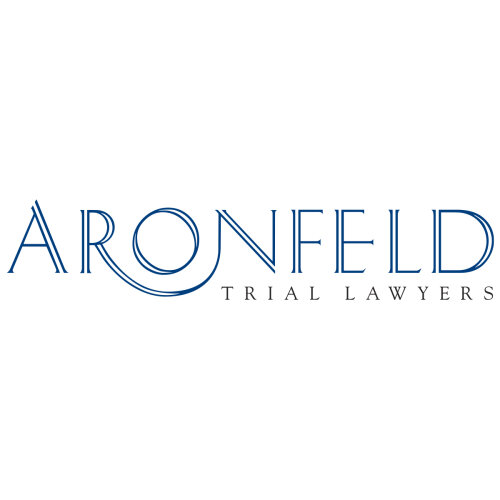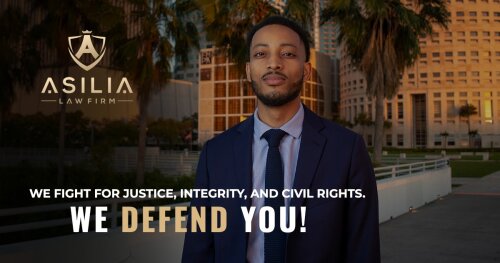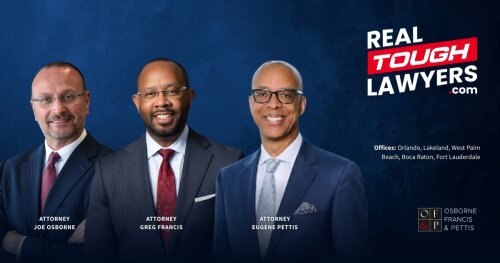Best Civil & Human Rights Lawyers in Florida
Share your needs with us, get contacted by law firms.
Free. Takes 2 min.
Or refine your search by selecting a city:
List of the best lawyers in Florida, United States
United States Civil & Human Rights Legal Questions answered by Lawyers
Browse our 1 legal question about Civil & Human Rights in United States and read the lawyer answers, or ask your own questions for free.
- My husband passed away five years ago. We have a property in th Philippines and I would like to transfer everything to my child. We are now residing in California, as U.S. citizens and my late husband a Filipino citizen.c
- How can I transfer Title on the property to my child?
-
Lawyer answer by Recososa Law Firm
Hello: We are sorry to hear about the passing of your husband, and we extend our deepest condolences. Regarding your concern, since your husband was a Filipino citizen and you are now both U.S. citizens residing in California, the property...
Read full answer
United States Civil & Human Rights Legal Articles
Browse our 2 legal articles about Civil & Human Rights in United States written by expert lawyers.
- How to Legally Use Education Savings Accounts - United States
- ESA programs use public education funds to pay for private school and related expenses, but they are created and controlled by state law, not federal law. Eligibility for the 2025-2026 school year under Senate Bill 2 will usually depend on state residency, school-age status, prior public school enrollment, and sometimes... Read more →
- Texas Parents' Bill of Rights 2026: Curriculum
- Parents in the United States have constitutional and statutory rights to direct their child's education, access school records, and challenge certain instructional materials and policies. State "Parents' Bill of Rights" laws like SB 12 usually give parents explicit rights to review teaching materials, see school library lists, consent to medical... Read more →
About Civil & Human Rights Law in Florida, United States
Civil and human rights law in Florida is designed to protect the fundamental freedoms and dignity of every individual within the state. These laws are rooted in the United States Constitution, federal statutes, and state-specific protections. Civil rights focus on ensuring equality and preventing discrimination based on race, religion, gender, disability, age, or other protected characteristics. Human rights go a step further, encompassing broader issues like freedom from abuse, access to basic needs, and fair treatment under the law.
In Florida, both state and federal courts play an active role in enforcing civil and human rights. State agencies and advocacy groups also support individuals facing rights violations. Whether the issue concerns employment discrimination, police conduct, voting rights, or access to public services, the law is meant to uphold fairness and equal treatment for all residents.
Why You May Need a Lawyer
There are many situations where seeking legal assistance is essential in the field of civil and human rights. Common scenarios include:
- Experiencing discrimination at work, school, or in public spaces
- Being denied housing or services based on a protected characteristic
- Facing harassment, retaliation, or threats due to race, religion, national origin, gender, or sexual orientation
- Encounters with law enforcement that involve possible excessive force or violations of rights
- Issues related to voter suppression or difficulties accessing polling places
- Attempting to address violations of the Americans with Disabilities Act (ADA)
- Immigration challenges where basic human rights may be at risk
- Denial of due process or fair treatment in government programs or benefits
An experienced attorney can clarify your rights, guide you through complex legal processes, represent you in court, and help secure the best possible outcome in your case.
Local Laws Overview
In Florida, civil and human rights protections blend federal and state laws. Significant statutes and legal frameworks include:
- The Florida Civil Rights Act, which prohibits discrimination in employment, housing, and public accommodations
- Protections under federal law, such as Title VII of the Civil Rights Act of 1964 and the Fair Housing Act, which also apply in Florida
- The Florida Constitution, which enshrines equal protection and due process rights
- State-level enforcement agencies like the Florida Commission on Human Relations, which investigates and acts on civil rights complaints
- Laws that address voting rights, including restoration of voting rights for individuals with prior felony convictions
- Disability rights laws that ensure accessibility in public and private spaces
- Anti-hate crime statutes and enforcement efforts by state and local authorities
It is important to note that local ordinances may provide additional protections beyond state and federal law, particularly in larger cities and counties within Florida.
Frequently Asked Questions
What is considered discrimination under Florida law?
Discrimination happens when a person is treated unfairly or unequally based on protected characteristics such as race, color, religion, sex, pregnancy, national origin, age, disability, or marital status. This can occur in employment, housing, education, or access to public facilities.
How do I file a civil rights complaint in Florida?
You can file a complaint with the Florida Commission on Human Relations, the Equal Employment Opportunity Commission, or other government bodies depending on the specific issue. It is often best to act quickly, as there may be filing deadlines.
What remedies are available if my civil rights were violated?
Available remedies may include monetary compensation, job reinstatement, policy changes, injunctive relief, and sometimes punitive damages. The exact remedy depends on the nature of the violation and the forum where your case is heard.
Are there laws protecting LGBTQ rights in Florida?
Yes, both federal and some local Florida laws prohibit certain forms of discrimination based on sexual orientation or gender identity, especially in employment. Protections may vary by city or county.
Can I sue law enforcement for civil rights violations?
If you believe your rights were violated by law enforcement, you may file a complaint with an oversight agency or pursue a lawsuit in state or federal court. These cases can be complex and usually require legal representation.
How does the Americans with Disabilities Act (ADA) apply in Florida?
The ADA is a federal law that requires equal access and prohibits discrimination based on disability. Florida law also offers similar protections, and complaints can be filed at both state and federal levels.
What should I do if I experience housing discrimination?
Document your experience and file a complaint with the Florida Commission on Human Relations, the U.S. Department of Housing and Urban Development, or reach out to legal aid organizations for help.
Are religious freedoms protected under Florida law?
Yes, the U.S. and Florida Constitutions guarantee freedom of religion, and various laws protect against discrimination based on religious beliefs in employment, education, and public life.
Do immigrants have civil rights protections in Florida?
Yes, non-citizens and immigrants are protected against discrimination, harassment, and abuse under most civil and human rights laws, though legal complexities may arise in certain situations.
Is there a time limit to file a civil rights claim in Florida?
Yes, there are deadlines called statutes of limitations. These vary depending on the type of claim and the forum, so it is important to consult with a lawyer or enforcement agency as soon as you suspect a rights violation.
Additional Resources
If you need assistance or more information on civil and human rights in Florida, the following organizations and entities are valuable resources:
- Florida Commission on Human Relations
- American Civil Liberties Union (ACLU) of Florida
- Florida Legal Services
- U.S. Equal Employment Opportunity Commission (EEOC)
- U.S. Department of Housing and Urban Development (HUD)
- Your local Legal Aid office
- County and city Human Rights Offices in Florida’s larger municipalities
Next Steps
If you believe your civil or human rights have been violated in Florida, take the following actions:
- Document the incident, including dates, times, witnesses, and any communication or evidence
- Preserve all relevant records such as emails, letters, or photos
- Contact a civil rights attorney or legal aid organization to discuss your situation
- Determine the appropriate agency for filing a complaint or lawsuit and be mindful of deadlines
- Follow your lawyer’s advice and keep detailed records throughout the process
Consulting with an attorney who specializes in civil and human rights law can help clarify your rights and offer a strategic approach. Many lawyers provide free initial consultations, which can help you understand your options and next steps.
Lawzana helps you find the best lawyers and law firms in Florida through a curated and pre-screened list of qualified legal professionals. Our platform offers rankings and detailed profiles of attorneys and law firms, allowing you to compare based on practice areas, including Civil & Human Rights, experience, and client feedback.
Each profile includes a description of the firm's areas of practice, client reviews, team members and partners, year of establishment, spoken languages, office locations, contact information, social media presence, and any published articles or resources. Most firms on our platform speak English and are experienced in both local and international legal matters.
Get a quote from top-rated law firms in Florida, United States — quickly, securely, and without unnecessary hassle.
Disclaimer:
The information provided on this page is for general informational purposes only and does not constitute legal advice. While we strive to ensure the accuracy and relevance of the content, legal information may change over time, and interpretations of the law can vary. You should always consult with a qualified legal professional for advice specific to your situation.
We disclaim all liability for actions taken or not taken based on the content of this page. If you believe any information is incorrect or outdated, please contact us, and we will review and update it where appropriate.
Browse civil & human rights law firms by service in Florida, United States
Florida, United States Attorneys in related practice areas.
Browse civil & human rights law firms by city in Florida
Refine your search by selecting a city.











